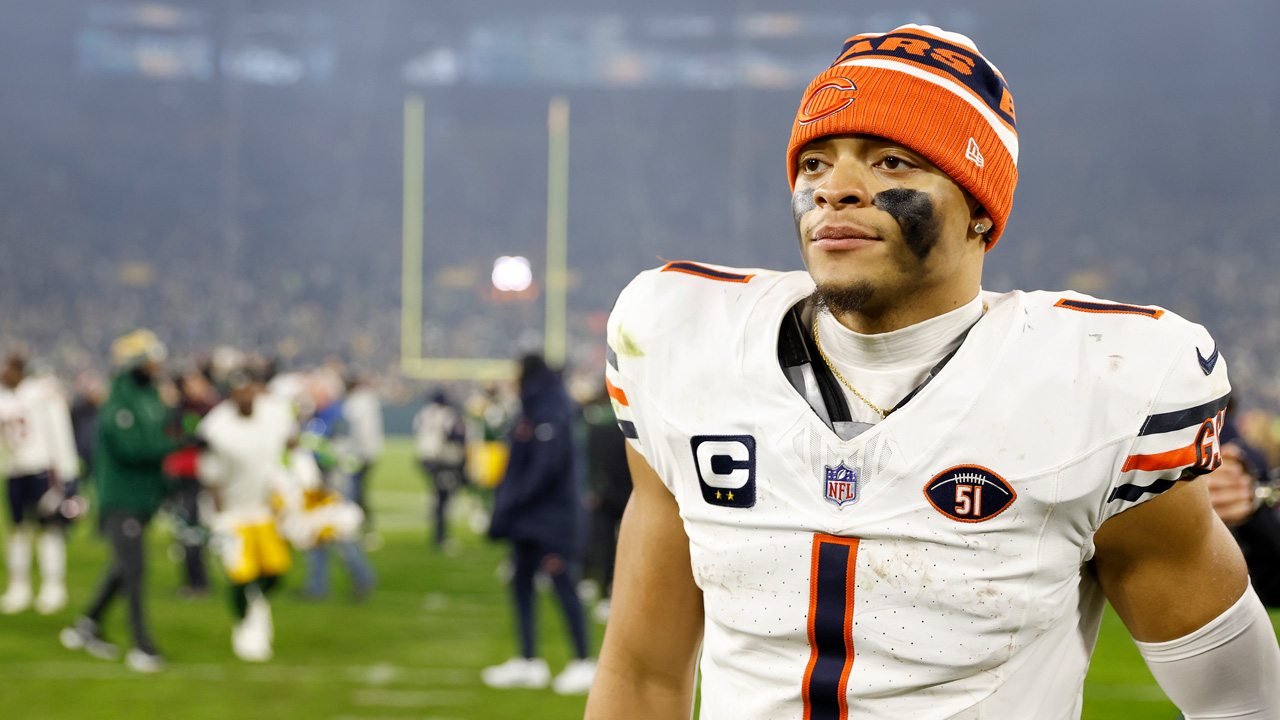Caleb Williams has become synonymous with several phrases early in the pre-draft evaluation process.
Generational. Franchise-changer. Special. Rare.
The 2022 Heisman Trophy winner has also been compared to one player repeatedly. That comp has rankled some feathers as the Bears prepare to make a franchise-defining decision by either drafting Williams with the No. 1 overall pick or sticking with Justin Fields.
Patrick Mahomes
The Mahomes comparison understandably draws a wide variety of responses. Some see the USC star’s improvisational ability and off-script playmaking as Mahomes-like and a reason to believe Williams will light the league on fire while ascending to top-five quarterback status shortly after arriving in the NFL.
There are, of course, others who view the Mahomes comp as blasphemy -- as a heretical phrase that disrespects one of the two greatest quarterbacks of all time and oversets expectations for Williams.
“No one is saying Caleb is going to come in and automatically be one of the greatest quarterbacks in history,” an NFC scout who sees the Mahomes comp told NBC Sports Chicago. “It took the right situation, coach, mentor, etc., for Mahomes to go from the gunslinger he was at Texas Tech to what you see now. Comps are not about saying player X is going to be player Y. It’s used to add context to the evaluation of certain skills. This player’s ability to do this reminds me of an NFL player’s ability to do the same.
“When you talk about ceiling and projection, does Williams have that ceiling? That would be unfair to put those expectations on him. Because then if he’s great but not transcendent, it’s a failure. He can be a star. He can be special. Whether or not he rises to that level will depend on a lot of things outside his control.”
CHICAGO BEARS
This naturally brings us to Mahomes and the Kansas City Chiefs’ overtime victory over the San Francisco 49ers in Super Bowl LVIII on Sunday.
Feeling out of the loop? We'll catch you up on the Chicago news you need to know. Sign up for the weekly Chicago Catch-Up newsletter.
Mahomes now has won three Super Bowls in five seasons. This latest victory came with Mahomes operating an offense with an aging Travis Kelce at tight end, a rookie No. 1 receiver in Rashee Rice, and not much else. Two years ago, the Chiefs traded Tyreek Hill and elected to poor the assets they got for him and the money he was due into the defense. General manager Brett Veach banked on Mahomes' greatness being able to outweigh a dearth of talent on the offensive side of the ball.
The 49ers, on the other hand, have elite, blue-chip talent all over the field: Running back, wide receiver, left tackle, tight end, defensive end, defensive tackle, linebacker, and corner.
Many viewed Super Bowl 58 as a glimpse at the two paths the Bears can take as they head into the next phase of their rebuild: Build around a quarterback with a slightly lower ceiling or search for an alien who can cover up any deficiencies on the roster and win despite of them.
That is a highly reductive way to view the decision the Bears have to make at quarterback.
The answer, as always, lies in the middle.
Finding the next Patrick Mahomes is an admirable goal for any franchise. What franchise wouldn’t want to unearth a pantheon-level signal-caller? Mahomes is a one-of-one. No question. But once teams and evaluators see something, it becomes easier to identify those traits in others. But hunting for the Halley’s Comet of NFL quarterbacks can also lead to crippling mistakes.
“It’s not as simple as drafting a future superstar,” a league source told NBC Sports Chicago. “Would Mahomes have been this if he landed elsewhere? Probably not. He would have been good but the Chiefs’ infrastructure – Andy and Alex [Smith] especially – allowed him to become this version. Drafting a talent like that is just the first step. You need to have everything else in place to make sure they become what you envision. It’s about marrying the talent and potential with roster support and coaching that allows for success. That’s easier said than done. Most teams fail at that in some way.”
The Bears could very well wind up viewing Williams as a Mahomes-level prospect. They are still extremely early in the quarterback evaluation process and likely won’t have a clear, 360-degree view of the class until after the NFL Scouting Combine.
But what the Bears should learn from the Chiefs’ dynastic run is not just to scour the Earth for the Holy Grail of quarterbacks. But to make sure that if you find a talent that can bend the league to his will, you surround that player with the requisite talent and coaching to foster the development needed to reach the historic ceiling you’ve identified.
The Chiefs saw something in Mahomes that no one else did. They saw vast potential. But they also saw a player who needed structure, guidance, and support to grow into the promise they saw.
Once Mahomes blossomed, the Chiefs were able to recalibrate their roster and move assets around with the faith that No. 15 could cover up any issues they had during a transitional period.
There are not two paths forward for the Bears. It’s one path that allows you to eventually branch out if you travel it correctly.
Identify the transcendent talent, develop it, support it, and then reap the rewards.
There are no quick fixes in the NFL.
Williams might become a cure-all for the Bears’ franchise like Mahomes has in Kansas City. But first, the Bears have to hold up their end of the bargain.




